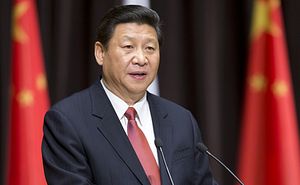Time once again for Friday’s China links:
Your must-read piece of the week is Evan Osnos’ profile of Xi Jinping in the New Yorker. It’s a thorough (and thoroughly fascinating) look at Xi’s rise to power, from a coddled princeling to a sent-down youth and the long trip back to elite status. As former Australian Prime Minister Kevin Rudd told Osnos, “The bottom line in any understanding of who Xi Jinping is must begin with his dedication to the Party as an institution—despite the fact that through his personal life, and his political life, he has experienced the best of the Party and the worst of the Party.”
For a prospective (rather than retrospective) look at Xi, check out Willy Lam’s piece in Foreign Policy, which predicts that Xi will break precedent and seek to stay in power for longer than the traditional 10-year term.
In other news, Nong Hong, writing for the Asia Maritime Transparency Initiative, explores China’s plan to reform maritime law enforcement, and what that might mean for maritime territorial disputes. China often pursues its claims through para-military means, using marine surveillance or maritime police to patrol contested waters. Those organizations, formerly spread across China’s bureaucracy, will not be united until the control of the State Ocean Administration. Presumably, that means China will step up coordination of patrols, and hints that Beijing is committed to a strategy of using the coast guard rather than the navy to enforce its claims.
Andrew Erickson and Conor Kennedy have more on China’s “maritime militia” in a piece for the Wall Street Journal. What is a maritime militia? “Such forces are typically comprised of civilian fishing vessels and fill a variety of roles,” Erickson and Conor explain. In China’s case, the “most advanced units” of the maritime militia “are even training to confront foreign ships, if necessary, in a guerrilla-style ‘People’s War at Sea’ with sea mines and anti-air missiles.”
Over at Financial Times, David Pilling argues that the U.S. lost one round of the battle for regional influence to China with the success of the Asian Infrastructure Investment Bank (AIIC). “Round two,” Pilling says, will be the final push to conclude the Trans-Pacific Partnership. Pilling is already calling round two as a win for China – “Even if TPP is finally concluded, the chances are it will be too watered down to satisfy trade purists and too intrusive to please Washington’s Pacific partners,” he writes.
Finally, to put you in a lighter mood before the weekend, check out the story of how BuzzFeed writer Matt Stopera became an internet celebrity in China — all because of a stolen iPhone.

































